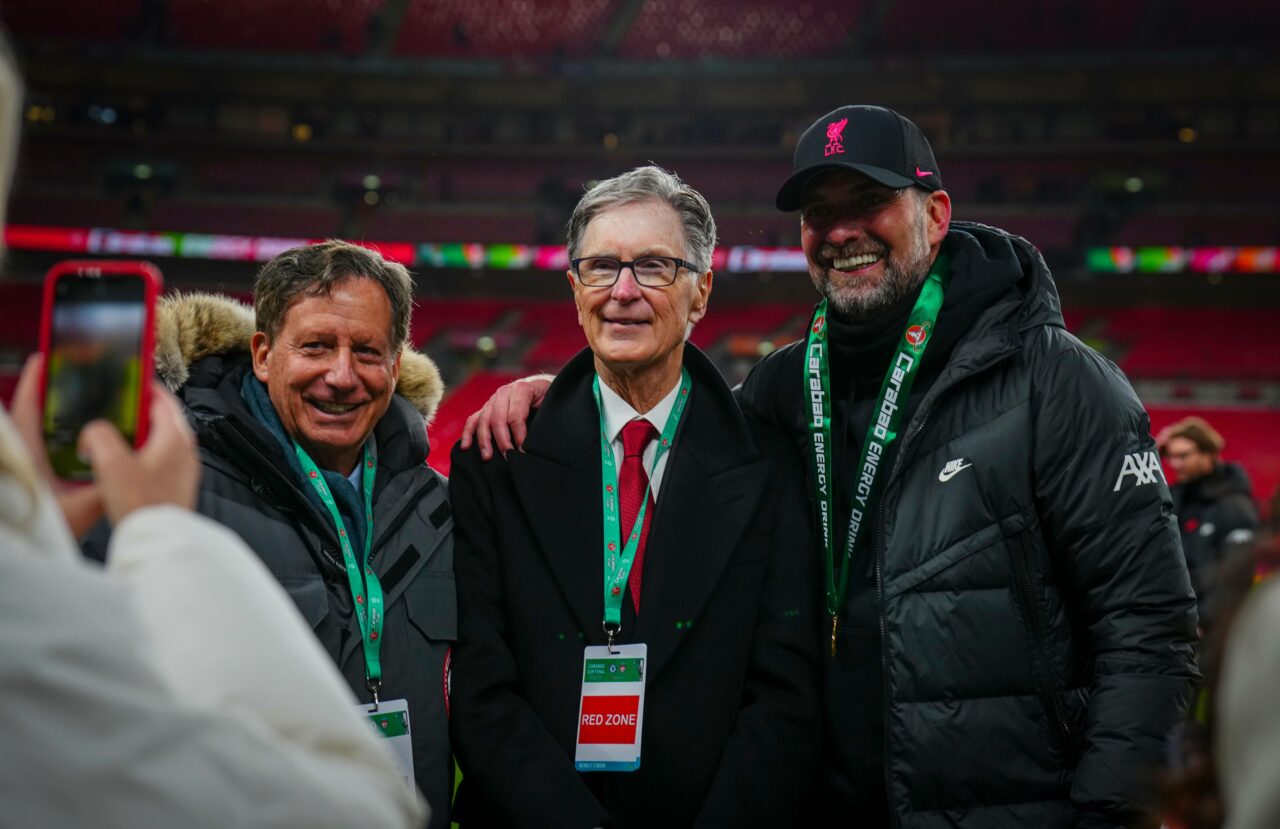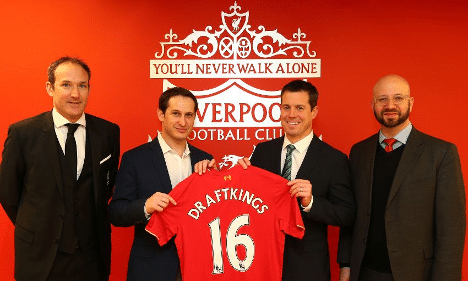Tom Werner: Bridging Liverpool FC and the US Gambling Boom

Tom Werner, the Chairman of Liverpool FC, is a central figure in the convergence of global football and the burgeoning US sports betting and gambling industries.
With its rich history and a global fan base exceeding 600 million, Liverpool FC has undergone a significant transformation under Werner’s leadership.
Since Fenway Sports Group (FSG) acquired the club in 2010, Liverpool FC has achieved notable successes, including securing the UEFA Champions League in 2019 and the Premier League title in 2020, ending a 30-year wait for the league championship.
Werner’s role in this evolving landscape is particularly noteworthy. As Chairman of Liverpool FC and a prominent figure in FSG, Werner is at the intersection of international football and American sports betting.
FSG has strategically aligned itself with leading gambling entities, including DraftKings. This partnership exemplifies how sports organizations are integrating betting into their commercial strategies.
DraftKings, valued at approximately $15 billion as of 2024, has become a major player in the US market through sponsorships, promotions, and partnerships.
A Legacy in Sports Ownership
Tom Werner’s influence in sports ownership is marked by transformative achievements and strategic vision.
As the Chairman of Liverpool FC and a co-founder of FSG, Werner’s legacy in sports management reflects a blend of innovation, strategic partnerships, and a commitment to enhancing the global profile of his sports properties.
Professional Timeline of Tom Werner
| 1978 | Begins Career in Media and Entertainment | Tom Werner starts his career in the media industry, initially working as a producer. His early work involves significant contributions to television programming. |
| 1980 | Co-Founds The Carsey-Werner Company | Werner co-founds The Carsey-Werner Company with Marcy Carsey. The company becomes renowned for producing hit television series, including The Cosby Show, Roseanne, and 3rd Rock from the Sun. |
| 1994 | Acquires Ownership Stake in Boston Red Sox | Tom Werner, along with John Henry and Larry Lucchino, acquires a controlling stake in the Boston Red Sox. This acquisition marks a significant move into sports ownership. |
| 2009 | Acquires Liverpool FC | Tom Werner, as part of FSG (formerly New England Sports Ventures), acquires Liverpool FC, one of England’s most storied football clubs. This acquisition marks FSG’s expansion into international football. |
| 2021 | Fenway Sports Group Acquires Additional Sports Assets | FSG, under Werner’s leadership, continues to expand its portfolio, acquiring additional sports assets and strengthening its position in the global sports market. |
Founding Fenway Sports Group

Tom Werner, alongside John Henry and other partners, co-founded FSG in 2001. This venture marked the beginning of a new era in sports ownership, characterized by strategic acquisitions and innovative management practices.
FSG’s acquisition of the Boston Red Sox, one of Major League Baseball’s most storied franchises, set the stage for their approach to sports management—supplementing commercial opportunities and enhancing team performance.
Acquisition of Liverpool FC
The purchase of Liverpool FC in 2010 represented a significant milestone for Werner and FSG. The acquisition was driven by a vision to revitalize the club and restore its historical success.
Under Werner’s stewardship, Liverpool FC underwent substantial changes, including strategic investments in player acquisitions and infrastructure improvements.
This included the ambitious redevelopment of Anfield, aimed at increasing the stadium’s capacity and enhancing the fan experience.
Revitalizing Liverpool FC
Since the acquisition, Liverpool FC has experienced a remarkable resurgence. Werner’s leadership has been instrumental in the club’s domestic and international successes.
Werner’s strategic decisions have led to Liverpool FC’s return to elite status.
The club’s victories in the UEFA Champions League and Premier League underline the effectiveness of FSG’s approach to sports management and investment.
Strategic Partnerships and Innovations
Tom Werner’s tenure at Liverpool FC has also been marked by strategic partnerships and innovations that extend beyond football.
These initiatives highlight how Werner and FSG have adapted to the evolving sports and entertainment landscape, integrating new revenue streams and enhancing the club’s global footprint.
Legacy and Influence
Tom Werner’s impact on sports ownership is evident in the success and global reach of Liverpool FC and Fenway Sports Group’s other properties. His approach to sports management emphasizes:
- Innovation: Embracing new technologies and business models.
- Strategic Vision: Long-term planning and investment in team success.
- Global Expansion: Enhancing the international profile of sports teams.
Werner’s legacy is marked by his ability to blend traditional sports management with modern business practices, ensuring that Liverpool FC and FSG remain at the forefront of the sports industry.
Fenway Sports Group and Gambling Ties
FSG, under the leadership of Tom Werner, has strategically positioned itself at the intersection of sports and gambling.
This connection reflects broader industry trends where sports entities are increasingly engaging with the gambling sector to enhance revenue streams and expand their market reach.
Strategic Partnerships with Gambling Companies
Fenway Sports Group has formed significant partnerships with major players in the gambling industry, capitalizing on the expanding US sports betting market.
These partnerships leverage FSG’s sports properties to drive mutual benefits in branding and revenue generation.

DraftKings Partnership
- 2020: DraftKings becomes an official sportsbook partner for the Boston Red Sox, a key FSG property.
- 2021: DraftKings and FSG announce a multi-year extension of their partnership, including branding and promotional activities.
- DraftKings Valuation: As of 2024, as Jackpot Sounds claims, DraftKings is valued at approximately $15 billion, reflecting its leading position in the sports betting market.
- Integration: DraftKings integrates its branding with Red Sox broadcasts, merchandise, and stadium promotions.
PointsBet Partnership
In 2021, PointsBet signed a sponsorship deal with the Boston Red Sox. The deal includes branding in Fenway Park and digital promotions, expanding PointsBet’s reach.
These partnerships illustrate FSG’s strategy to align with gambling firms, enhancing their sports properties’ commercial appeal and tapping into the growing sports betting market.
Liverpool FC and Betting Sponsors
Liverpool FC’s association with Fenway Sports Group brings indirect connections to the gambling sector through various sponsorships and marketing agreements.
While the club’s direct betting partnerships are less pronounced, FSG’s broader gambling-related activities influence Liverpool FC’s commercial strategies.
Betting Sponsorship Trends and Commercial Benefits
- 2020–2024: Increased visibility of betting brands in sports sponsorships, including football clubs.
- Liverpool FC: While Liverpool FC itself does not have a prominent betting sponsor, its association with FSG aligns it with broader industry trends.
- Revenue Growth: Enhanced commercial revenue through strategic partnerships and marketing activities linked to the gambling sector.
- Fan Engagement: Innovative fan engagement strategies leveraging betting-related promotions and digital platforms.
The influence of FSG’s gambling ties extends to Liverpool FC, affecting its commercial strategies and market positioning.
Impact of Legalization of Gambling and Sports Betting in the US
The 2018 Supreme Court decision to overturn PASPA has been a catalyst for the growth of the US sports betting market.
This regulatory change has significantly impacted sports organizations, including those under FSG’s ownership.
Market Growth
- 2018: PASPA is overturned, allowing states to legalize sports betting.
- 2023: US sports betting revenue reaches $5.6 billion, up from $1.5 billion in 2018.
- Projected Growth: By the end of 2024, over 50 million Americans are expected to engage in sports betting.
FSG’s partnerships with gambling companies reflect a strategic response to the expanding market.
Increased revenue opportunities through sponsorship deals, digital marketing, and fan engagement related to sports betting.
FSG’s proactive engagement with the gambling sector illustrates how sports organizations are adapting to the evolving regulatory landscape and capitalizing on new revenue streams.
Technological Innovations and Digital Integration
FSG’s ties to the gambling industry are also reflected in its approach to technology and digital integration, enhancing the fan experience and expanding commercial opportunities.
Digital Platforms and Technological Advancements
- Integration: Use of digital platforms for betting promotions, fan engagement, and interactive experiences.
- Data Analytics: Leveraging data analytics to enhance marketing strategies and target audience engagement.
- Mobile Betting: Promotion of mobile betting apps and platforms, aligning with modern consumer preferences.
- Virtual Engagement: Use of virtual technologies to enhance fan experiences and integrate betting promotions.
These technological advancements underscore FSG’s commitment to integrating gambling-related innovations into its sports properties, driving engagement and revenue growth.
Future and Strategic Directions
As the US sports betting market continues to evolve, FSG’s strategic focus will likely include further expansion and innovation in its gambling-related activities:
- New Partnerships: Potential for new partnerships with emerging gambling firms and technologies.
- Global Reach: Exploring opportunities to extend gambling-related strategies to international markets.
- Adaptation: Continued adaptation to regulatory changes and consumer trends in the sports betting industry.
- Innovation: Investment in innovative technologies and digital platforms to stay ahead in the competitive landscape.
FSG’s prospects in the gambling sector will be shaped by its ability to adapt to industry changes and capitalize on emerging opportunities.
Impact on Liverpool FC
The influence of Fenway Sports Group’s ties to the gambling industry has been significant for Liverpool FC, manifesting in several key areas, including
- revenue growth,
- global brand visibility,
- public relations, and
- commercial strategies.
This relationship, while indirect, underscores how FSG’s broader commercial activities have impacted the club’s operations and market presence.
Revenue Growth Through Strategic Partnerships
Liverpool FC, under the ownership of FSG, has experienced notable revenue growth, which can be partially attributed to strategic partnerships and broader commercial initiatives associated with the gambling sector.
FSG’s strategic alignment with major betting firms, while not always directly visible in Liverpool FC’s sponsorship deals, has influenced the club’s commercial strategies and market positioning.
Lately, Liverpool FC has seen a substantial increase in revenue. For instance, in the 2019–2020 fiscal year, the club’s revenue reached approximately £533 million (about $674 million), a significant rise from £455 million ($568 million) in the previous year. Even during the challenging 2020–2021 period because of the COVID-19 pandemic, the club managed to maintain robust revenue at around £487 million ($609 million).
This financial strength is supported by the club’s enhanced commercial strategies, which are indirectly influenced by FSG’s broader engagement with the gambling sector.
Matchday revenue also reflects this growth, with Liverpool FC earning £74 million ($91 million) in the 2020–2021 season, up from £64 million ($79 million) in the previous year. Additionally, merchandise sales have surged, highlighting the increased global brand visibility and fan engagement that FSG’s commercial activities have facilitated.
Enhanced Global Brand Visibility
The impact of FSG’s partnerships with gambling companies extends to Liverpool FC’s global brand visibility. The club’s market reach has been bolstered through digital and promotional activities that leverage the growing prominence of betting firms.
This strategic approach has significantly enhanced Liverpool FC’s profile on the international stage.
Liverpool FC’s social media following has grown to over 100 million across platforms such as Facebook, X, and Instagram.

The club’s fan base, estimated to be around 600 million worldwide, benefits from increased engagement through various digital and promotional channels that are influenced by FSG’s partnerships with betting entities.
Integration of Betting-Related Promotions
Liverpool FC has increasingly integrated betting-related promotions into its commercial strategies, aligning with broader industry trends.
This includes incorporating betting advertisements into digital and traditional media and engaging fans through interactive experiences linked to betting promotions.
The club has also embraced technological advancements to enhance fan interaction. This includes integrating betting-related features into mobile apps and digital platforms, as well as using virtual technologies to offer immersive fan experiences that align with betting promotions.
These initiatives reflect Liverpool FC’s adaptation to modern commercial practices influenced by FSG’s gambling-related activities.
Navigating Regulatory Changes
The evolving landscape of sports betting regulations has implications for Liverpool FC’s commercial strategies.
The Supreme Court’s 2018 decision to overturn PASPA has led to a rapidly expanding US sports betting market, which affects how sports organizations, including Liverpool FC, approach betting-related activities.
Liverpool FC, alongside FSG, must navigate these regulatory changes and ensure compliance in its commercial endeavors.
Adapting to new regulations and aligning commercial strategies with evolving legal frameworks are crucial for optimizing revenue and maintaining fan engagement. This adaptability is essential as the sports betting market continues to grow and change.
Growth Opportunities
Looking forward, Liverpool FC is well-positioned to benefit from ongoing developments in the sports betting industry. FSG’s strategic vision includes potential new partnerships and sponsorships with betting firms, which could further enhance the club’s revenue and market presence.
The club also has opportunities to expand its betting-related activities into international markets, leveraging its global brand to capitalize on emerging trends.
Investment in digital platforms and innovative technologies will likely continue to play a key role in enhancing fan engagement and integrating betting promotions into Liverpool FC’s commercial strategies.
While Liverpool FC’s direct involvement with betting sponsors may be limited, the indirect impact of FSG’s gambling-related activities is evident in the club’s revenue growth, global brand visibility, and commercial strategies.
As the sports betting market evolves, Liverpool FC’s relationship with FSG’s broader commercial ventures will continue to shape its success and market presence.
The Regulatory Landscape
The regulatory landscape for gambling in the United States has evolved significantly over the decades, particularly impacting both the broader gambling sector and the specific area of sports betting. These regulations have shaped the industry’s growth, operational standards, and market dynamics.
Historical Overview of Gambling Regulations
Understanding the historical context of gambling regulations helps to appreciate the current regulatory environment. The evolution of these laws has been influenced by shifting public attitudes and economic considerations.
Early Regulations (1920s–1950s)
Gambling regulation in the US began with the establishment of state lotteries and the legalization of casino gambling in Nevada. These early regulations set the stage for the gambling industry’s growth, with Nevada becoming the hub for casino operations.
The Wire Act of 1961
Initially aimed at prohibiting interstate wagering on sports, this federal law was a significant regulatory measure impacting sports betting and other forms of gambling.
The Unlawful Internet Gambling Enforcement Act (UIGEA) of 2006
This act focused on online gambling, particularly by prohibiting financial institutions from processing transactions related to unlawful online gambling. UIGEA did not explicitly address sports betting but had a significant impact on the broader online gambling landscape.
The Supreme Court Decision of 2018
The overturning of PASPA (Professional and Amateur Sports Protection Act) by the Supreme Court was a landmark event, enabling states to legalize sports betting individually and reflecting a shift towards more liberal gambling regulations.
Current Regulatory Framework for Gambling
The regulatory landscape for gambling today is a mix of federal and state-level regulations, addressing various forms of gambling, from traditional casino operations to online gambling and sports betting.
The Wire Act Reinterpretation
In 2018, the Department of Justice reinterpreted the Wire Act to allow interstate online gambling, expanding opportunities for online poker and casino games. This decision marked a significant shift in federal gambling regulation.
The Gambling Addiction Prevention Act
Federal legislation aimed at addressing gambling addiction, including funding for research and treatment programs, reflects the government’s commitment to mitigating the negative impacts of gambling.
Each state has its own regulatory framework governing various forms of gambling. States like New Jersey and Pennsylvania have fully embraced both online and land-based gambling, while others maintain restrictive policies.
Impact on the Gambling Industry
The evolving regulatory landscape has significantly impacted the gambling industry, influencing its growth, operational standards, and market dynamics:
- Economic Impact: The US gambling industry, including sports betting, is a major economic contributor. In 2023, the industry generated approximately $60 billion in revenue, up from $40 billion in 2018, reflecting the post-PASPA market expansion.
- Employment: The gambling sector supports hundreds of thousands of jobs across various roles, from casino operations to online gaming support.
- Online Gambling: The regulatory changes have facilitated the growth of online gambling platforms, with a significant increase in online casino revenues. Online gambling revenue reached $11 billion in 2023, showing robust growth since the UIGEA’s impact.
- Mobile Betting: The rise of mobile betting apps has been a key trend, driven by regulatory support for digital platforms. Mobile sports betting now represents over 80% of the total sports betting handle in many states.
Challenges and Future Directions
As the gambling industry continues to evolve, it faces several challenges and opportunities influenced by the regulatory landscape.
- Regulatory Complexity: The patchwork of state regulations can create complexities for operators, particularly those looking to operate across multiple jurisdictions. Navigating these regulations requires careful compliance and strategic planning.
- Responsible Gambling: Ensuring responsible gambling practices remains a critical focus, with increasing attention to problem gambling prevention and support. Regulatory bodies are emphasizing the need for operators to implement measures to address gambling addiction.
- Future Developments: As technology advances and public attitudes towards gambling continue to evolve, future regulatory changes are likely. This includes potential updates to federal regulations and new state-level initiatives aimed at expanding or restricting gambling activities.
The regulatory landscape for gambling in the United States is a dynamic and evolving field, shaped by historical legislation, current regulations, and future trends.
The impact on the industry, including both gambling and sports betting, highlights the importance of staying informed and adaptable in a rapidly changing environment.
Tom Werner’s Attitude Towards Gambling
Tom Werner, known for his influential roles in media and sports, has approached gambling with a pragmatic and strategic mindset.
His attitude is shaped by his leadership of major sports franchises, including the Boston Red Sox and Liverpool FC, and is informed by the evolving regulatory landscape and commercial opportunities within the gambling industry.
A Pragmatic Approach to Gambling
Tom Werner’s perspective on gambling is grounded in a practical understanding of its commercial implications. As a key figure in sports ownership, Werner’s involvement with gambling intersects primarily through strategic partnerships and sponsorship deals. His approach to these partnerships reflects a focus on leveraging commercial opportunities while adhering to the regulatory requirements.
Under Werner’s stewardship, the Boston Red Sox and Liverpool FC have engaged in numerous sponsorship deals with gambling operators.
For instance, Liverpool FC has collaborated with betting companies such as 888 Holdings and BetVictor. These partnerships not only provide substantial financial support but also contribute to the teams’ visibility and global reach.
In 2023, Liverpool FC reported commercial revenues exceeding £200 million, a significant portion of which can be attributed to such partnerships.
Commitment to Responsible Gambling
Although Werner’s direct role in gambling is limited, his management of sports teams necessitates a strong commitment to responsible gambling practices. This is especially pertinent given the increasing integration of gambling promotions in sports media and fan engagement strategies.
The rise of sports betting, following the repeal of PASPA in 2018, has seen states like New Jersey and Pennsylvania legalize and regulate betting markets.
In 2023 alone, the sports betting handle in New Jersey surpassed $10 billion, highlighting the sector’s rapid growth.
Werner’s approach to managing this aspect involves supporting responsible gambling initiatives to mitigate potential risks associated with problem gambling.
Werner’s sports franchises are required to align with industry best practices, which include supporting initiatives aimed at preventing gambling addiction. This alignment is critical in ensuring that promotional activities do not contribute to harmful gambling behaviors.
The Gambling Commission in the UK and various state regulatory bodies in the US mandate that sports organizations promote responsible gambling messages, a standard that Werner’s teams adhere to.
Strategic Partnerships and Commercial Success
Werner’s management strategy often involves forging partnerships with gambling operators to enhance revenue streams. These collaborations are strategically important for sports franchises, providing significant financial benefits while requiring careful regulatory compliance.
In 2023, the Boston Red Sox signed a multi-year partnership with a major sports betting operator, reflecting a broader trend in the sports industry.
Such deals are not only financially lucrative but also strategically valuable in expanding the team’s commercial footprint. The Red Sox’s revenue from sponsorships and partnerships has seen a marked increase, contributing to a total revenue of approximately $500 million in 2023.
Werner’s leadership ensures that these partnerships are conducted with integrity and in alignment with legal and ethical standards. This includes ensuring that any associated marketing and promotional activities are managed responsibly, and avoiding aggressive tactics.
Balancing Ethics and Commercial Opportunities
Tom Werner’s approach to gambling is characterized by a balance between commercial success and ethical considerations. His strategic management emphasizes the importance of integrating commercial opportunities with a commitment to responsible practices.
The sports industry’s growing reliance on gambling partnerships reflects its potential for significant revenue generation.
However, Werner’s management style underscores the importance of maintaining ethical standards and responsible practices. The goal is to achieve long-term success for the sports franchises while ensuring that all gambling-related activities adhere to regulatory requirements.
The Bottom Line
Werner’s strategic use of gambling sponsorships has been instrumental in driving revenue and expanding the global reach of his teams.
For instance, Liverpool FC’s partnerships with major betting firms have contributed significantly to the club’s commercial success, with reported revenues exceeding £200 million in 2023.
Similarly, the Boston Red Sox’s multi-year deals with sports betting operators reflect a growing trend in the sports industry to integrate gambling partnerships as a key revenue stream.
Despite the financial benefits, Werner’s management ensures that these partnerships are handled with a strong commitment to responsible gambling.
Moreover, Werner’s pragmatic approach extends to adapting to the evolving regulatory landscape. The repeal of PASPA in 2018 and the subsequent growth of sports betting have created new opportunities and challenges.
Related
Sports Betting Giant Flutter Forecasts Strong U.S. Growth To Drive…
Flutter CEO Peter Jackson.Courtesy of Flutter Entertainment Flutter Entertainment, the world’s largest online gambling company, said that it’s expecting str
BetBlocker Enters US Responsible Gambling Market
The charity, originally from the UK, launched a US unit, BetBlocker US, as part of its North American entry. The organiz
Viewers react to ’embarrassing’ JD Vance comment toward Zelenskyy as…
Social media users watching clips of the heated meeting between President Donald Trump, Vice President JD Vance and President Volodymyr Zelenskyy have called a
Ukraine latest: Zelensky urges Trump to stand ‘more firmly on…
We have Zelensky's statement in full Below, we have Ukrainian president Volodymyr Zelensky’s statement in full after touching down in the UK following a fiery














